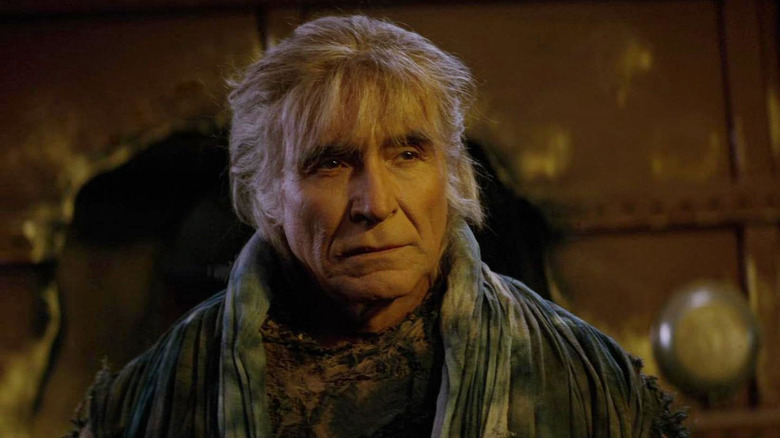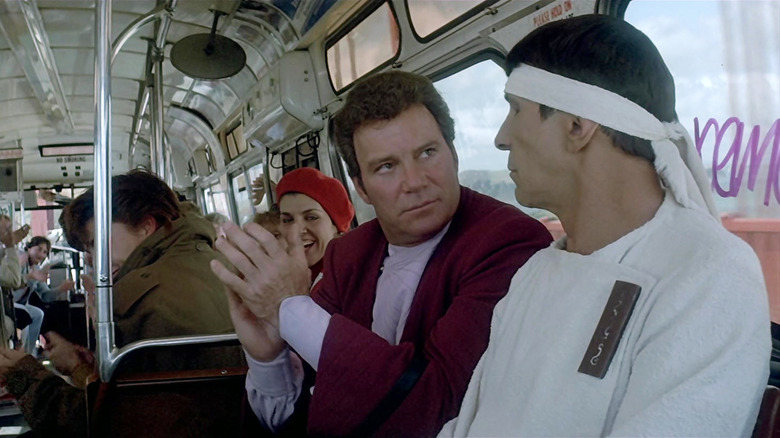Paramount
Among the thirteen existing “Star Trek” films, the 1982 sequel “Star Trek II: The Wrath of Khan,” directed by Nicholas Meyer, is almost universally hailed as the best. The film’s larger-than-life villain, Khan, and Ricardo Montalbán’s equally grandiose performance are beloved by many fans. The film reaches its peak when Khan hijacks the U.S.S. Reliant to engage in a thrilling ship-to-ship duel with Admiral Kirk, played by William Shatner, onboard the U.S.S. Enterprise. Khan, a character left on the desert wasteland of planet Ceti Alpha V by Kirk in the episode “Space Seed,” seeks revenge after narrowly surviving an environmental catastrophe.
The plot of “The Wrath of Khan,” penned by Harve Bennett and Jack B. Sowards, revolves around the theme of consequences. Kirk, who is known for his bold and often reckless leadership, is forced to confront the repercussions of his actions. In addition to dealing with a vengeful adversary, he discovers he has a grown son he’s never met, forcing him to reevaluate his life. In a poignant ending, Spock, played by Leonard Nimoy, sacrifices his life, underscoring the inevitability of consequences and the impermanence of youth.
Bennett wasn’t solely a writer for “The Wrath of Khan.” He also served as a producer for the “Star Trek” franchise, joining the team in 1980 after the financial failure of “Star Trek: The Motion Picture.” He continued to produce several more films in the series.
During a 2010 interview with StarTrek.com, Bennett was asked to name his favorite “Star Trek” film. His answer? “The Wrath of Khan.”
Harve Bennett’s Favorite: The Wrath of Khan

Paramount
Interestingly, “Star Trek IV: The Voyage Home,” directed by Leonard Nimoy in 1986, was the most financially successful “Star Trek” movie until the release of J.J. Abrams’ “Star Trek” in 2009. Despite its financial success, Bennett admitted that he, like many Trekkies, favored “Wrath of Khan.” He stated, “My instinct is to say, ‘You bet, IV is my favorite,’ but then I have to stop and say that I love ‘IV,’ but ‘II’ will always have a special place in my heart for the reasons we discussed and more.”
When Bennett joined the team for “The Wrath of Khan,” he wasn’t a Trekkie. To prepare, he watched every episode of the original series. He was particularly inspired by the episode “Space Seed,” which left him wondering what Khan’s fate might be 25 years later. This curiosity ultimately led to the creation of one of the most beloved “Star Trek” films.
However, Bennett also had high praise for “The Voyage Home,” a film with an equally unique premise. In this installment, the Enterprise crew travels back in time to 1986 to save a pair of humpback whales from extinction. Bennett appreciated this film’s novel concept and its broad appeal to audiences.
Bennett’s Appreciation for The Voyage Home

Paramount
Given the commercial failure of “Star Trek: The Motion Picture,” a new creative team, excluding “Star Trek” creator Gene Roddenberry, was assembled for the sequels. Bennett, new to the team, crafted a successful storyline for “The Wrath of Khan.” However, it was a gamble. If the film had failed, it might have been the end of “Star Trek” films. Fortunately, both “Wrath of Khan” and “The Search for Spock” were successful. By the time “The Voyage Home” was in production, confidence was high. Bennett believed the time-travel plot would appeal to a wider audience.
His belief proved correct. Bennett was pleased with the film and its reception. While “Wrath of Khan” remained his favorite, “Voyage Home” received more praise from the producer. He stated, “Going back to the present created something that nothing else could have done, which is it presented ‘Star Trek’ to a non-‘Trek’ audience. That’s why it was the biggest hit and in many ways the most popular of the ones I did.”
The memorable “nuclear wessels” scene features Chekov (Walter Koenig) seeking nuclear power for his spaceship. He doesn’t know where to find it, so he simply asks passersby, complete with a Russian accent, where the “nuclear wessels” are. Amid the Cold War in 1986, this scene was particularly humorous.
Credit: www.slashfilm.com


